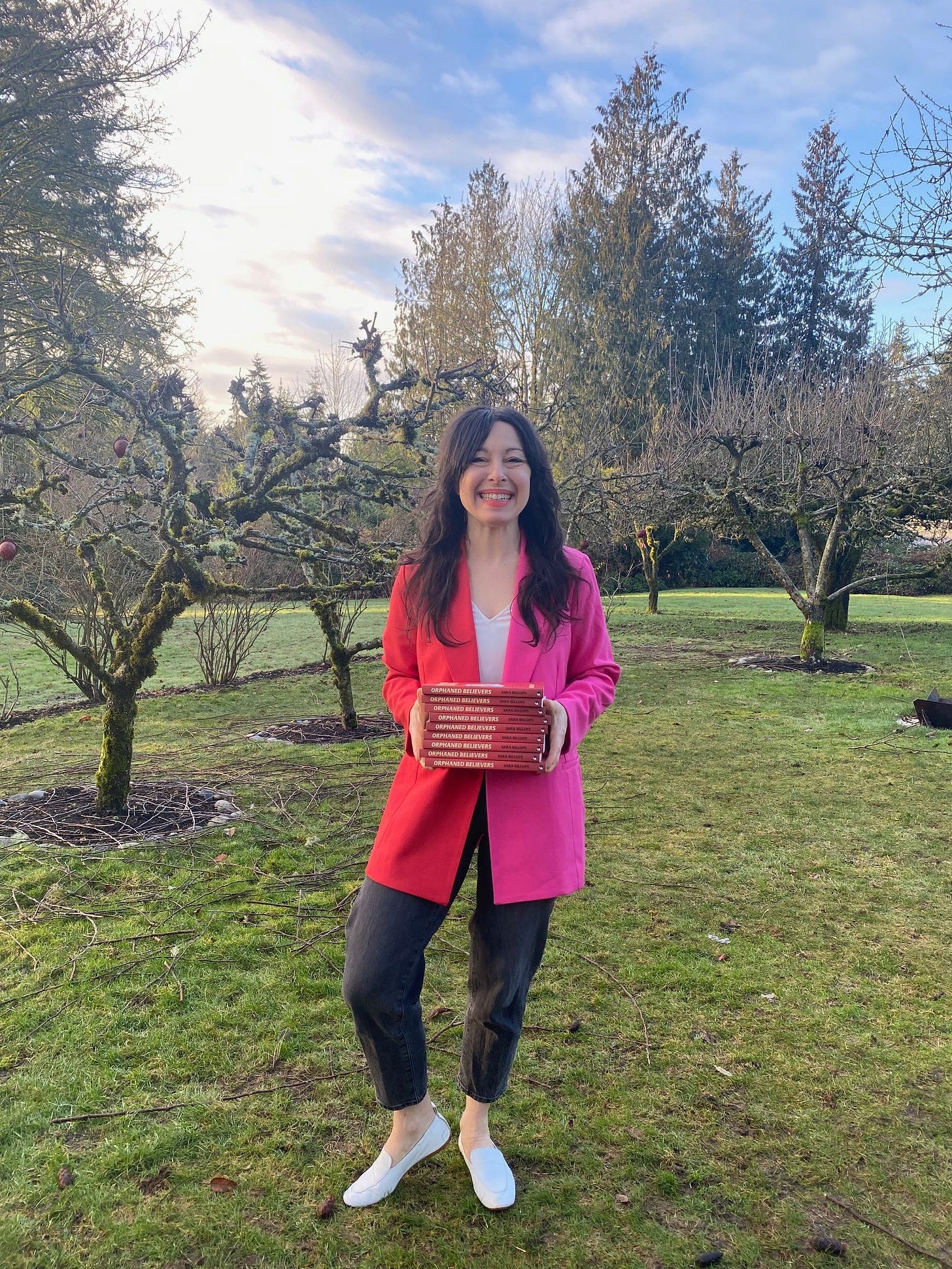This Edition of Ecstatic is by Sara Billups
I found a literary agent. I got a book deal. I wrote a book and it is now in the wide world.
But three years before, when the whole thing began, I wrote a piece for Ekstasis called “The Irresistible Peril of Publishing.” I’d connected with Conor at a serendipitous moment—we were both at the start of something new. We were asking similar questions: Could there be a platform for publication that made welcome creative writers of faith—a place where art and ideas could flourish?
I’d written creatively, in secret, and professionally for years, but had only recently started to share work publicly about Christianity and culture.
Conor had recently started Ekstasis, introducing a digital publication and keepsake print editions that felt like generous hope. Writing is solitary, but maybe I was less alone than I thought. The whole project and growing community around Ekstasis felt a lot like rest.
As I began to form a book proposal, I worked out a central question in that essay: What do we gain and what can we lose on the path to publishing a book?
I shared a quote from a 2017 Anne Lamott TED talk on the difference between writing and publishing that rings quite true: “It’s also a miracle to get your work published... just try to bust yourself gently of the fantasy that publication will heal you. That it will fill the swiss-cheesy holes inside of you. It can’t, it won’t. But writing can.”
In Before and After the Book Deal, the novelist Kristopher Jansma shares advice for first-time authors: “Most of the stress you go through while being an author is really about worrying that if you don’t perform well enough, you’ll somehow have to stop being a writer. But you were a writer before you started being an author, and you will still be one afterward.”
You’re a writer first, and you’ll be one after you publish.
You’re a writer first, yes, and that is a lonely place for a lot of us. But there are spaces of community that can carry you through. I believe it because I’ve seen it.
There are places that ground us, check our ego, bring out the best in us. To keep going, don’t go it alone, make mistakes, feel weird, feel proud, be grounded, cringe at yourself, cheer yourself on, but cheer other people on more. Look for other people to move through the wild world of publishing with you, look for third spaces. Publication will not heal a thing, but a community like this one will.
Ekstasis Editor, Conor Sweetman, sat down for a quick chat with Sara Billups to reminisce and expand on her ideas above. Answers are edited for length and clarity.
Conor: So now that you've gone through the actual process of the “traditional” world of publishing, and now you have an actual book out,
what perspective did you bring to that process?
Sara: I wanted it to feel like me. And so I decided that I wanted the publishing process to be celebratory and fun and to have a community feel. So all the way through, I just decided that I could let myself off the hook, not take myself so seriously. The book had so much research and took a year to write and a year to edit, but then in talking about it, I wanted it to have a feel of lightness and fun. So I tried to make it a little bit more “irreverent.”
Conor: Speaking of your book, I've seen you use the phrase “Orphaned Believers” for many years now. Has your thinking evolved at all over the years on what this term encapsulates?
Sara: It's clarified, and simplified. Before I would think about it culturally, I would think about it spiritually, and generationally—there were a lot of lenses I put that phrase through. Those are still important to me, but it's just become so clear that when I say “orphaned believer,” I just mean anybody that identifies as a Christian and looks around the American church and is trying to find Jesus right now. And I think that that message hopefully crosses party lines and I hope that can kind of resonate with more people… I think there's a way to talk about what's wrong in a way that doesn't make an enemy, but that leads with empathy and that brings people back around to Jesus and the revolutionary work of Jesus. That is hard to do and it’s a fine line to walk.
Conor: You deal with hard conversations in your work, but yet you bring levity and a light-heartedness, or at least you attempt to… I'm curious, how have you honed that and where do you think even your own personality comes into that?
Sara: To publish a book, as many of us know, we have to have some kind of social media platform we're following, especially in Christian publishing. So I just told my friends in real life, “Hey, I'm gonna try to grow here. And if you see me looking weird or if something doesn't seem like it is consistent with who you know me to be—call me out.” So I went with accountability and tried to say from the beginning, “let me pull back the curtain and tell you people on internet-land, I'm here because I'm trying to write a book and I need to have a community around me that can help me do that.” And also, because I care about talking about this stuff and I want to be honest. I think that helped set the tone for me to be able to continue to do that… I think that anytime you can be quirky or a little weird, there's a space to bring our full selves, even if it's a little wacky. I don't take myself so seriously, even though it's serious stuff.
Conor: Only a couple more questions. With all your magazine and non-profit writing in the past, was there a pivotal point where you saw a shift in your vocation or career?
Sara: Yes! Well, I was writing about food, coffee, parenting—I was writing about a lot of that kind of stuff. I was writing around six articles a day and felt like I was just churning out content. But I began to realize that that had taken out a lot of space for me to think creatively or to have any kind of spaciousness in my writing. And so for me, when I was in my late 30s, I decided to go back to grad school for nonprofit leadership and transition into working in nonprofit space and communications—because I realized writing for me had to be something that was infused in my work, but not this thing that I was centering my day around, or else there was no margin… And so that happened around the same time that I began to have something to say about the Church and culture. And I had a lot of fear about doing that. That's a whole other story. But when I finally did, it became quite liberating and a space for me to truly move into.
Conor: How do you view the impact of the “Christian publishing industry” on the larger writing community?
Sara: The recent CT feature about Christian publishing was a really helpful piece. A lot of that information wasn’t necessarily new to those of us swimming in those waters, but the fact that issues of platform and publishing are being talked about in a broader way is really exciting. I think that since I started trying to grow a platform—again, can anyone say the word platform without cringing—but when I did that, I think that there was kind of a formula: you had a hashtag, you posted this number of times and there was a “way to do it” on your path to publishing. Now, however, I think that it's becoming clear that a lot of us don't know what the secret is to getting something published or getting a book deal. It just seems a little more mysterious. And that's a good thing because I hope there's an opening up for real literary voices and creative voices… On Instagram, if you look at a writer like Emma Straub, or if you look at really successful, exciting people writing fiction and nonfiction for a Big 5 house, the way that they're showing up on Instagram is, “Here's my cool book launch cake or cookies” Or “here’s my life” and here's—sort of kind of—me. It's not like, “let me help you in your life, and here’s my hashtag.” It would be awesome if this space continued to make a way for writers to be able to give our full self and creative self to our work and less to an online presence, while also maintaining really healthy conversations and good connections. I think that would be really meaningful and valuable.
Conor: Okay, last question: Orphaned Believers. How does your book contribute to the larger conversation about faith and spirituality in America today?
Sara: I see this as a moment in history when we're struggling to come to terms with who we are as the Church. And I think those of us with hearts that are burning for change, those of us that can do the work from inside the Church, that have the space to do that, it's a really compelling place to be. And also for those of us that are not sure what we believe or what to call ourselves or what words to use about our faith, or have been hurt in a real way, it's an invitation to the tenderness and hope of Jesus. And so the common denominator of orphaned believers are people that move towards the hope that will not leave us as orphans, but that will rescue us. For me, there is a great community and a great hope for restoration and flourishing, even if that takes a little while. I hope that the book, while challenging a lot of what went wrong in the 80s and 90s, and is a throughline to today, can also be an encouragement for people to hold on—to know they're not alone. There are other people standing with you, even if it might feel very isolated or solitary.








This was such timely advice to soak in! And what a beautiful community Ekstasis has become.